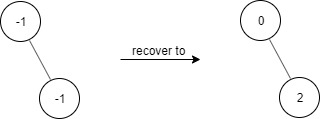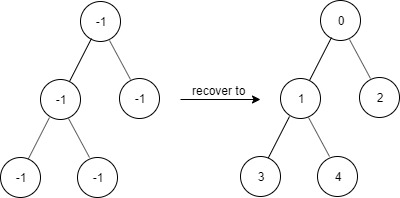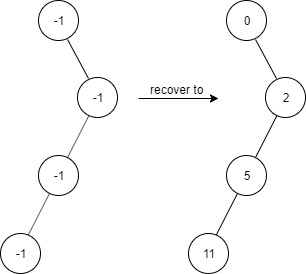Find Elements in a Contaminated Binary Tree - Medium Problem
This problem demonstrates clearly that both in Mathematics as well as in Computer Science/Algorithms, one of the key points to solving a problem correctly is understanding the problem correctly. Here we go https://leetcode.com/problems/find-elements-in-a-contaminated-binary-tree/



Given a binary tree with the following rules:
root.val == 0- If
treeNode.val == xandtreeNode.left != null, thentreeNode.left.val == 2 * x + 1 - If
treeNode.val == xandtreeNode.right != null, thentreeNode.right.val == 2 * x + 2
Now the binary tree is contaminated, which means all
treeNode.val have been changed to -1.
You need to first recover the binary tree and then implement the
FindElements class:FindElements(TreeNode* root)Initializes the object with a contamined binary tree, you need to recover it first.bool find(int target)Return if thetargetvalue exists in the recovered binary tree.
Example 1:

Input ["FindElements","find","find"] [[[-1,null,-1]],[1],[2]] Output [null,false,true] Explanation FindElements findElements = new FindElements([-1,null,-1]); findElements.find(1); // return False findElements.find(2); // return True
Example 2:

Input ["FindElements","find","find","find"] [[[-1,-1,-1,-1,-1]],[1],[3],[5]] Output [null,true,true,false] Explanation FindElements findElements = new FindElements([-1,-1,-1,-1,-1]); findElements.find(1); // return True findElements.find(3); // return True findElements.find(5); // return False
Example 3:

Input ["FindElements","find","find","find","find"] [[[-1,null,-1,-1,null,-1]],[2],[3],[4],[5]] Output [null,true,false,false,true] Explanation FindElements findElements = new FindElements([-1,null,-1,-1,null,-1]); findElements.find(2); // return True findElements.find(3); // return False findElements.find(4); // return False findElements.find(5); // return True
Constraints:
TreeNode.val == -1- The height of the binary tree is less than or equal to
20 - The total number of nodes is between
[1, 10^4] - Total calls of
find()is between[1, 10^4] 0 <= target <= 10^6
The main problem will be to Find the elements in the tree. Just a bool yay or nay. And if you notice, the max number of (integer) elements in the tree is 10,000. We're talking about storing 10,000 int. This is a tiny number which can be stored in a hash table. So from the get-go, the strategy will be to store the entire tree into a hash table to make the "Find" operation O(1)-time.
Next, we don't really need to set the value of each node in the tree. The problem is not asking for that. Hence, we can pretty much ignore the value of each node inside the Tree object, and only use the rules given to populate the hash table (we'll call it cache). That should do the trick. Cheers, ACC.
public class FindElements
{
private Hashtable cache = new Hashtable();
public FindElements(TreeNode root)
{
FillCache(root, 0);
}
public bool Find(int target)
{
return cache.ContainsKey(target);
}
private void FillCache(TreeNode node, int val)
{
if (node == null) return;
if (!cache.ContainsKey(val)) cache.Add(val, true);
FillCache(node.left, 2 * val + 1);
FillCache(node.right, 2 * val + 2);
}
}




Comments
Post a Comment